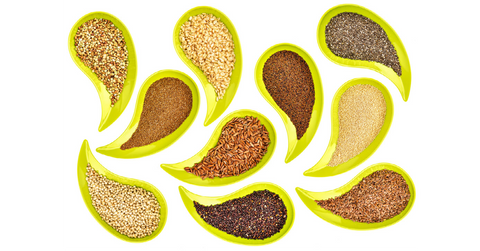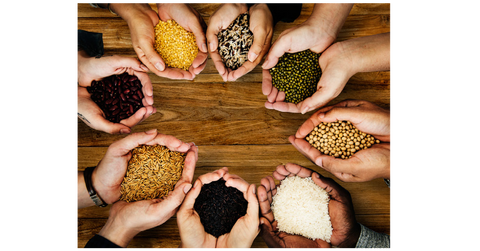
Not sure what it means? Here is an explanation on seed types
Share
We know that there is horticultural and agricultural lingo that could easily get lost in translation. We're here to help!
Each type of seed has their own pros and cons depending what you would like to use them for.
Open Pollinated, Heirloom, Hybrid F1 & F2, GMO, Certified Organic and Treated & Untreated Varieties.
These are some of the terms relating to seeds that we have been asked about. We would love to share our knowledge to help our customers with a fun gardening experience and a successful gardening journey.
Please note that you cannot tell the difference between these types of seeds by sight.

Open Pollinated Varieties (OPV)
Open pollinated seed is a term used to describe seeds that are grown through natural pollinators and fertilisers such as birds, bees, rain and the wind. The seed of these varieties will grow out true to type year on year with minor natural genetic variations - these variations help the plant to adapt to the environment.
Plants grown from OPV seeds tend to have a lower natural tolerance to some diseases and require a more attentive gardener to spray a fungicide or pesticide regularly to keep the plant producing healthy and edible fruits.
Heirloom Varieties
Heirloom is a term used to best describe an OPV that has stayed true to type over generations and over a long period of time. Like a family heirloom that many pass down generations within families, these varieties are also passed down through generations of seed and plants. All Heirloom varieties are Open Pollinated, however, not all Open Pollinated Varieties are Heirloom.
Heirloom seed raised plants would also require a regular application of a pesticide and fungicide to keep the plant healthy and providing delicious produce. These plants also have variations in the yields of produce.
Hybrid Varieties (F1/F2)
There are many benefits to a hybrid variety. Hybrid seeds are grown by intentionally cross pollinating 2 or more varieties (but same species) with the purpose of obtaining the best trait of each variety. This typically leads to varieties that have resistance to disease, more tolerance to extreme weather conditions, stronger colours, or better tasting fruits.
The term "F1" refers to the generation of Hybrid, F1 means First Generation Hybrid - whereas F2 is a second Generation Hybrid. The seeds that are harvested from these hybrids will still germinate and grow into flowering or fruit bearing plants, however the fruits will not be true to the type of the F1 Hybrid, or the plant habit may vary. They will typically show traits of their individual parent plants and not have the benefits or advantages of the hybrid plant that the seeds were harvested from.
Hybrid varieties typically provide better yielding and are more vigorous plants that provide uniform growth and fruits. These plants also have a slightly higher natural disease tolerance and therefore requires a less regular application of fungicide or pesticide to keep the plant healthy and disease free.

Genetically Modified Organisms (GMO)
Organisms (seed or otherwise) that have been genetically modified within a laboratory and have undergone specific genetic mutations are items that are considered Genetically Modified. This is not to be confused with Hybrid varieties that are not modified within a Laboratory. GMO seeds can include crossing different species of plants. Gro-Pak does not stock genetically modified seeds.
Certified Organic Seeds
